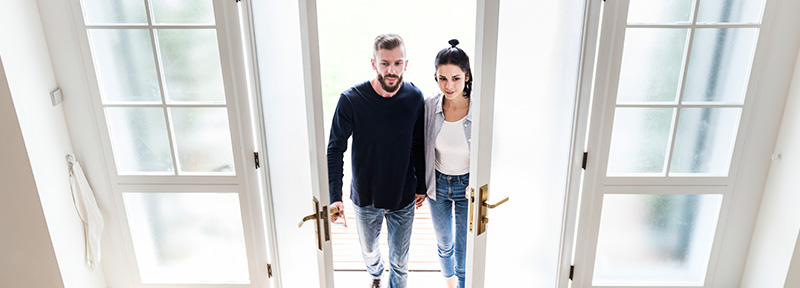
For new construction, a recent purchase or maintaining an older house, homeowners can purchase a home warranty at any time for any home. Providing peace of mind, as well as helping protect and maintain household budgets, home warranties can make a big difference for you and your family, but you may still need more information regarding what these types of guarantees are and what is covered, the benefits and issues you may encounter, and what questions should be asked prior to signing a contract.
What is a home warranty and how is it different than home insurance?
A common misconception is that homeowner’s insurance is the same as a home warranty. Major damages such as fires, hail, and property crimes that could affect one’s personal home or possessions are covered by homeowner’s insurance. In contrast, a home warranty places a contract between a homeowner and a home warranty company. This contract gives the homeowner benefits of discounted repair and replacement services on appliances, including electrical, air conditioning, ductwork, water heaters, washers, dryers, refrigerators, and dishwashers.
If you do not have a home warranty you can go directly to a contractor of your choice for services. On the other hand, home warranty companies have contracts with certain approved service providers. Because of this, when something breaks down, the homeowner calls the home warranty company who then sends one of their approved providers to come and inspect the problem. In this situation, the home warranty company is essentially the liaison between the customer and the service provider.
The Cost:
Home warranties normally cost hundreds of dollars a year and can either be paid upfront or in installments depending on the home warranty company you choose.
- Apart from a new house, the property’s age does not influence the cost of the home warranty. If it is a new home, the homeowner will have a builder’s warranty which covers major structural elements of a new house from physical damage and a manufacturer’s warranty for new appliances. Windows, tiles, and distribution systems such as electrical and plumbing will also be covered. For new appliances, the manufacturer’s warranty typically lasts for the first 12 months and can be extended with an extended warranty if one chooses to. New house homeowners should read their builder’s and manufacturer’s warranties to see what it covers and what it doesn’t.
- If your house is less than 5,000 square feet, the price will not be affected in most cases.
- Within a basic policy, guesthouses will not be covered. However, with an additional fee, it can be covered or a separate contract.
- A normal home warranty can typically cost between $350 – $600 per year with about $50 – $100 for each repair or service visit (prices dependent upon warranty company and location in the country).
A home warranty is not a 100% solution to all your home repairs. In few instances, some repairs will not be covered by the home warranty company because it is not in the contract or they don’t offer coverage for that repair. It is vital for the homeowner to know what is being covered in their contract and spend additional money on coverages that are deemed important. There are various levels of contracts that can be purchased. Make sure you understand which you are purchasing.
Pros:
- If you prefer not to worry about finding a contractor when you have a problem, warranties may be the best option since they have preferred contractors for you to use.
- A home warranty is for homeowners who are not well versed in their home’s systems and appliances, how properly it has been maintained, and how well it was built. One can just call the home warranty company, and a contractor will evaluate the damage and fix it. There is no need to do research to find different parts and make sure if they will be compatible.
- Another great benefit to home warranties is their flat rates. When a repair needs to be made, sometimes it can cost the homeowner hundreds or even thousands of dollars if the burden was on them to fix it. However: with a home warranty plan, this is not an issue. A repair that could cost hundreds or thousands can be fixed by the fixed rate decided in the contract, even though it is lower than the repair cost. This could mean big savings on major repairs. Ask your warranty company about deductibles. Choosing a high deductible on your warranty will yield a lower annual fee.
- In the case you sell your home, most home warranties can be easily transferred to the next homeowner. Make sure your contract states that the home warranty is transferrable.
Cons:
- Home warranties normally do not have the best quality or satisfaction rate. Warranty contracts may state that they will replace the unit with the same features. This can leave the door open to variances of brand and color. An air conditioner in a distinct color may not be an issue, but a stove or refrigerator in a different color could be upsetting. In addition, if you prefer a certain model or brand for replacement parts, your preference is not always satisfied. Essentially, you have less control over what type of replacement is used.
- Certain repairs can be denied due to specific guidelines of the warranty. For example, mini-split AC systems are not covered by most home warranties. Most home warranties will only cover the primary kitchen refrigerator. In addition, in some warranty plans, window AC units are not covered. With regard to the outdoor AC condensing unit, there is no guarantee that your equipment will be repaired with the Original Equipment Manufacturer (OEM) designed/specified components. The contract states it could be replaced with a “like” component that may not be qualified or specified by the component manufacturer or the Original Equipment Manufacturer (OEM). Many home warranty companies may buy a surplus of rebuilt compressors (which may not be certified under UL requirements) to get a better price on replacement components. (Buyer beware)
- At times, home warranties can become expensive. According to Investopedia, it may make more sense to put payments into an emergency fund to use for any repairs that come up.
Here are a few questions one should ask the home warranty company to better understand their coverages and contract:
- Is the compressor replacement in my HVAC system factory authorized by my system manufacturer? Is it UL recognized?
- What is covered and not covered by the specific home warranty?
- Can you tell me more about the deductibles?
- What kind of service calls are covered?
- Can I choose my own contractor?
- Is there a limit to the number of repairs in my contract?
- Are multiple systems and appliances covered?
- Do you offer discounts for multiple-year coverage?
- What is the process if I have a claim?
- Does it matter if my home systems and appliances are old?
- What if my service claim is denied?
- What is the length of my contract?
- What if I’m not satisfied with the contractor that was chosen by a home warranty company?
- When do you authorize full system replacement versus component changeouts?
Overall, when selecting a home warranty plan, it is important to understand what the contract covers and look for any small-print conditions within the contract.
Tell us of any experience(s) with home warranty programs you may have encountered. Let us know what you think of this article below and if there any other topics you would like us to cover!
Read Next: Busting Myths on Home Warranty



